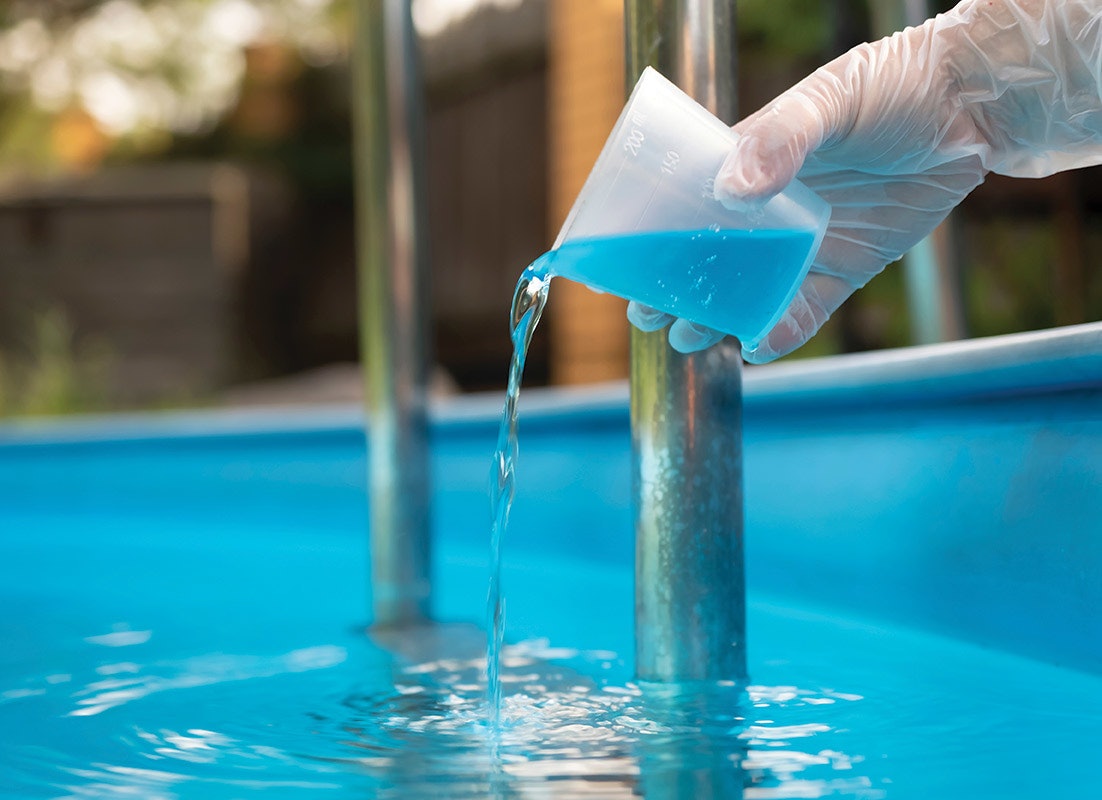Using a Flocculant treatment in your pool has benefits besides using it to turn a green algae pool once it loses control maintaining proper levels the calcium hardness and other minerals will go a long way to providing a balanced and healthy swimming pool. Does pool flocculant reduce hardness?
Introduction:
Pool flocculants are chemical compounds used to clarify pool water by causing small particles to clump together, making them easier to remove through filtration or vacuuming. They are especially useful for addressing cloudy water caused by suspended particles like dirt, debris, or algae.
Water hardness refers to the concentration of minerals, primarily calcium and magnesium ions, dissolved in water. High levels of hardness can lead to scaling on pool surfaces, cloudy water, and equipment damage over time. Managing water hardness is crucial for maintaining a clean and balanced pool environment. Regular testing and proper chemical treatment are necessary to prevent hardness-related issues and ensure optimal water quality and equipment longevity.
The hardness of water is determined by the milligrams of calcium carbonate per liter and is reported in parts per million (ppm). In general
- water with less than 60 ppm can be considered soft
- water with 60-120 ppm is moderately hard
- water with greater than 120 ppm hard.
Does Pool Flocculant Reduce Hardness
No, a flocculant treatment will settle out suspended particles that may or may not carry minerals such as calcium, and remove them indirectly but will not be sufficient as a Hardness reducer.
Fresh water should cut the amount of calcium carbonate and other heavy metals building up in the pool water. This is true unless the supply water contains a higher amount of calcium hardness. Test the faucet or hose water coming into the house for levels of calcium hardness.
Pool flocculant, while effective in clarifying pool water by causing small particles to clump together for easier removal, does not directly reduce water hardness. Hardness in water refers to the concentration of minerals like calcium and magnesium ions, which can lead to scaling and cloudy water. Flocculants primarily target suspended particles, not dissolved minerals. However, by removing these particles, flocculants indirectly improve water clarity, making it easier to monitor and address hardness issues. Here’s a breakdown: 
- Clarity Enhancement: Pool flocculants work by coagulating small particles suspended in the water, causing them to clump together and settle to the bottom of the pool or become trapped by the filter.
- Particle Removal: While flocculants effectively clear the water of debris, algae, and other suspended particles, they do not directly address dissolved minerals responsible for water hardness.
- Indirect Benefits: By eliminating suspended particles, flocculants indirectly improve water clarity, making it easier to detect and manage hardness issues.
- Regular Maintenance: To effectively manage water hardness, pool owners should employ proper maintenance routines such as regular testing and balancing of pH and alkalinity levels, as well as using appropriate calcium hardness reducers or water softeners if necessary.
- Prevention Strategies: To prevent scaling and other issues associated with hard water, consider using a water softening system or regularly draining and refilling the pool with fresh water to dilute mineral concentrations.
While pool flocculants are valuable for enhancing water clarity by removing suspended particles, they do not directly reduce water hardness. Proper management of hardness requires separate strategies focused on balancing mineral concentrations in the pool water.
The water in your pool appears cloudy and you notice sediment buildup on the bottom, and adding clarifiers and shock doesn’t solve the issue, you likely have hard water.
Test the water with a reliable (our recommendation) Pool Testing Kit to determine the calcium level.
It should read between 155 and 400 parts per million (ppm); aim for about 275 ppm for the most balanced water. To achieve the ideal calcium level, pool professionals first balance the water’s pH, then the alkalinity, and finally the calcium.
Lowering Calcium Hardness Level
Using a flocculant before draining and replacing the water can help reduce calcium hardness in a swimming pool with a water hardness significantly higher than 400 ppm. Flocculant is an additive that removes free-floating calcium (undissolved calcium) from the pool water.
After adding the flocculant to the water and vacuuming the sides and bottom of the pool to remove the remaining calcium carbonate particles, backwash the filter. There are only a few ways to lower your pool’s high calcium hardness level and that is to:
- Partially or completely drain your hard pool water and replace it with fresh water. The first option to make your pool water softer is to drain some water and add some new, fresh water. Start by turning off your pool. Then drain just a few inches of water from your pool with a pump. If you have access to a fresh (not hard) water source, use that to replace the drained water
- Use a Flocculant treatment on your pool water
- Muriatic acid won’t reduce the water’s calcium hardness, but it will raise the saturation level, which can help bring the water back into balance.
Addressing Water Hardness
Water hardness refers to the concentration of dissolved minerals, primarily calcium and magnesium ions, in water. These minerals are naturally present in many water sources and can enter the water through the dissolution of rocks and soil. The level of water hardness is typically measured in parts per million (ppm) or grains per gallon (gpg).
The main causes of water hardness include:
- Calcium carbonate and magnesium carbonate dissolved in water from limestone and dolomite rocks.
- Calcium sulfate and magnesium sulfate from gypsum and other minerals.
- Calcium chloride and magnesium chloride from the dissolution of salts.
High levels of water hardness can lead to various issues such as scale buildup on pool surfaces and equipment, cloudy water, and reduced effectiveness of chlorine and other pool chemicals.
Flocculants are designed to address suspended particles in pool water, such as dirt, debris, and algae, by causing them to clump together for easier removal through filtration or vacuuming. However, flocculants do not directly affect the concentration of dissolved minerals responsible for water hardness.
Water hardness is primarily managed through chemical treatments such as adding calcium hardness reducers or using water softeners. These treatments aim to sequester or remove calcium and magnesium ions from the water, thus reducing its hardness.
While flocculants can indirectly improve water quality and clarity, they do not target or reduce the dissolved mineral content responsible for water hardness. Proper management of water hardness requires separate strategies focused on balancing mineral concentrations in the pool water.
Can I Use Clarifier After Flocculant?
Clarifiers are used after Flocculant
Removing light floc left over from quick-settling heavy floc
Floc knocked into suspension vacuuming
High TDS/Salt in H2O prevents flocculation.
Using too much flocculant
Low pH start ………………………………………………………………………….. Read more
How Pool Flocculant Works
Pool flocculants function by promoting the aggregation of small, suspended particles in pool water. These particles, which can include dirt, debris, algae, and other contaminants, are often too small to be effectively filtered out by the pool’s filtration system. Flocculants work by causing these tiny particles to clump together into larger masses, making them easier to remove through filtration or vacuuming. This process results in clearer water and helps improve overall water quality.
Flocculants primarily target suspended particles in the pool water. These particles can range in size and composition but commonly include organic matter such as dirt, algae, oils, and other debris. When flocculant is added to the pool water, it forms a chemical reaction that causes these small particles to coagulate and form larger masses known as flocs.
These flocs can then either settle to the bottom of the pool or be trapped by the pool’s filtration system. As a result, the pool water becomes clearer, with a significant reduction in visible particles and cloudiness. Regular filtration and backwashing of the pool’s filtration system are essential to effectively remove these flocs and maintain clear water.
Indirect Impact on Water Hardness

While pool flocculants do not directly reduce water hardness, they can have an indirect impact on hardness levels through their role in improving water clarity. By effectively removing suspended particles from the water, flocculants enhance clarity and visibility, making it easier to monitor and manage water chemistry parameters, including hardness.
Clearer water allows pool owners to detect and address hardness issues more promptly, ensuring timely intervention with appropriate chemical treatments or adjustments. Additionally, by maintaining optimal water quality, including proper pH and alkalinity levels, flocculants indirectly support the effectiveness of hardness management strategies.
Although flocculants do not directly alter hardness levels, their contribution to overall water quality can indirectly facilitate more effective hardness control and maintenance. The relationship between water clarity and hardness management lies in the interplay between various water chemistry parameters and their impact on overall pool maintenance. Clarity serves as a visual indicator of water quality, reflecting the absence of suspended particles and contaminants.
Clearer water not only enhances aesthetics but also facilitates more accurate testing and monitoring of hardness levels. By maintaining clear water, pool flocculants indirectly support hardness management efforts by allowing pool owners to identify and address hardness-related issues promptly.
Furthermore, proper management of hardness, including regular testing and chemical treatment, contributes to maintaining water clarity over time. The clarity-hardness relationship underscores the importance of holistic pool maintenance practices that consider the interconnectedness of water chemistry parameters in ensuring a clean, balanced, and visually appealing pool environment.
Conclusion:
In conclusion, while pool flocculants play a crucial role in enhancing water clarity by effectively removing suspended particles, they do not directly impact water hardness levels. Water hardness, determined by the concentration of dissolved minerals like calcium and magnesium ions, requires separate management strategies such as chemical treatments with calcium hardness reducers or water softeners.
Despite not directly affecting hardness, the indirect impact of flocculants on water clarity is significant. Clearer water allows for better monitoring and management of hardness levels, as well as other water chemistry parameters. By facilitating prompt detection and intervention of hardness-related issues, flocculants indirectly support overall water quality and maintenance efforts.
In essence, while flocculants contribute to a visually appealing pool environment, comprehensive pool maintenance practices that address both clarity and hardness are essential for ensuring optimal water quality, equipment longevity, and swimmer comfort. By incorporating proper testing, treatment, and monitoring routines, pool owners can maintain a balanced and enjoyable swimming experience for all.
A pool flocculant is a chemical that helps to remove small particles from pool water, these particles can include dirt, debris, algae, and bacteria. Flocculants work by clumping these particles together helping them settle out so that they can be removed from the pool H2O .……………………………………. Read more

References:
Pool Factory- Balancing Calcium Hardness
FAQ’s

